Occupying an enviable site at the
Fair's Main Gate, the RCA Pavilion is highlighted in this photo
of the giant World's Fair model, on display at the American Express
pavilion across the street from RCA.
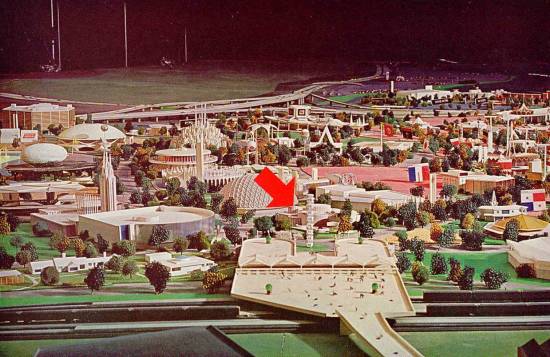 |
|
-
Wayne
Bretl with
excerpts from
BROADCAST NEWS
|
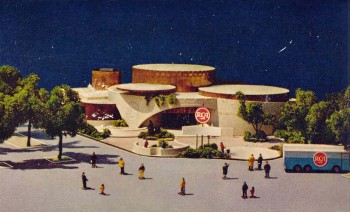
|
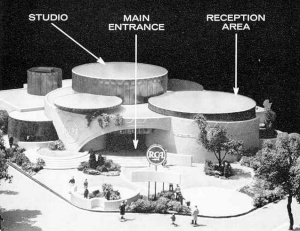 |
The main form of the RCA building
was a set of intersecting drums. The exterior was white with
copper decorations at the top of the walls. The largest, central
room was the color TV studio. The next smaller drum was the reception
area and "see yourself on color TV" area. The third
major room was the control center. There was also a small room
for demonstration of stereo sound. |
| The illustrations from Broadcast
News that are shown above depict the model as the pavilion
would be approached by visitors. The entry was at the junction
of the studio and reception "drums," and the "welcome
sign" used a color TV instead of an ordinary sign. This
was very leading-edge for that date! Visitors could enter a queue
leading to the "see yourself" area. |
Welcome "sign" at the
RCA Pavilion was a Color TV broadcast too!
SOURCE: ©
2005 Wayne Bretl, personal collection June/July 1965
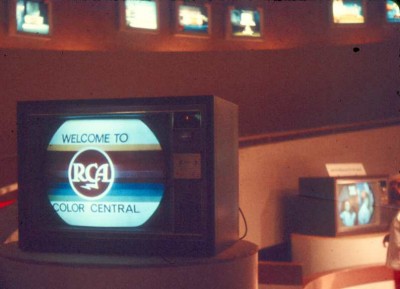 |
| The rest of the trip through
the pavilion was by walking a series of ramps. First, visitors
circled up around the reception area. Here, RCA products were
to be displayed. Broadcast News states that RCA had decided
to concentrate on Color TV rather than to attempt to compete
for attention regarding the computer or defense businesses which
were represented strongly by other companies at the Fair. |
Detail of the cut-away model shows
how the Production Studio would look from a visitor's-eye view.
The detailed model left nothing to the imagination! Notice the
broadcaster at the podium stands in front of a miniature Unisphere
backdrop!
SOURCE: All
model shots on this page from BROADCAST NEWS, Vol 118,
Oct. 1963, published by Radio Corporation of America Broadcast
and Communications Products Division, Camden, NJ
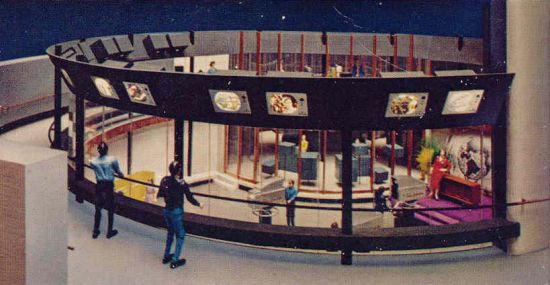 |
| The ramp then became a gallery
along one side of the studio and passed over the control room
as a bridge so that one could look to either side to see various
equipment and operations (the bridge is removed in the cut-away
models shown below). |
Close-up views of the RCA Pavilion
from two different angles. The cut-away model shows detailed mock-ups
of the main exhibit areas. Circular central drum contains the
studio area with control room immediately adjacent. Brown carpeted
drum contained the Reception Area with the "See Yourself
on Color TV" exhibit. Smaller rooms to the side contained
listening areas for hi-fi stereophonic equipment.
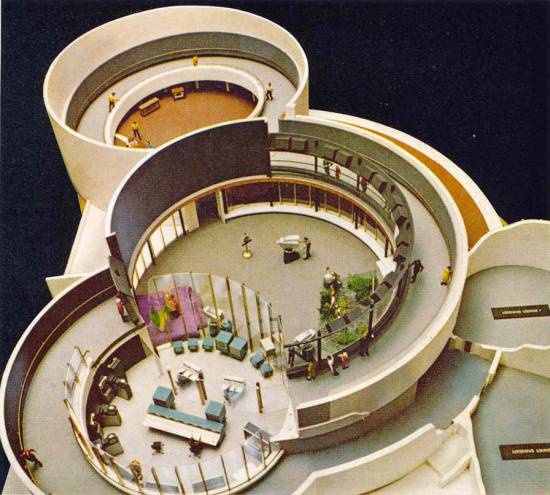 |
|
Finally there was a down-ramp
around the back of the control area. The studio-produced pictures
were displayed in black-and-white and color simultaneously. Various
monitors in the control room showed other productions or films
that were being transmitted to the gallery by closed circuit.
According to Broadcast
News, the facility was planned for five major activities:
live studio, closed circuit television carried over telephone
company cables to multiple receivers (those that were scattered
over the Fairgrounds, presumably), "See Yourself on Color
TV," supplementary film video for the gallery, and live
transmission and tape recording of remote pickups.
|
An organist plays in the studio
and visitors see the television broadcast in black-and-white and
color on different monitors.
SOURCE: © 2005 Wayne
Bretl, personal collection June/July 1965
|
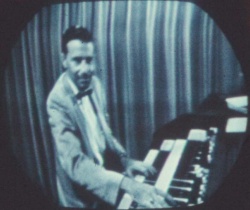
|
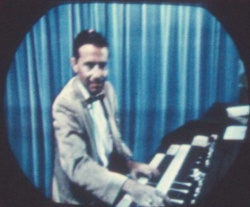
|
|